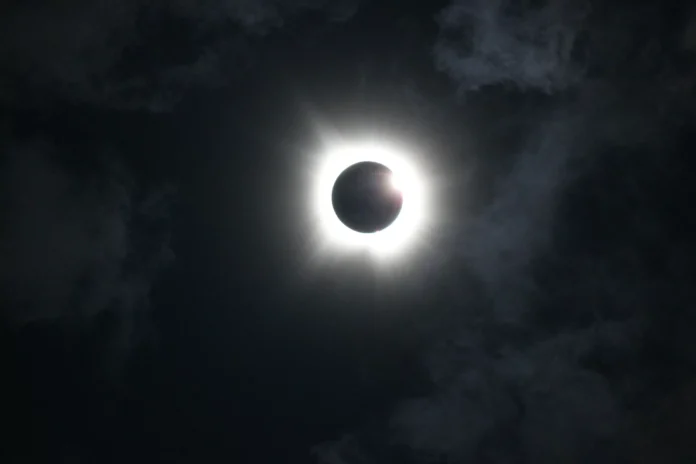Monday’s solar eclipse may not have reached totality in the Chicago area, but it certainly made an impact on the region’s weather. Despite the disappointment of not experiencing a total eclipse, residents were able to witness some fascinating changes in the weather, thanks to the National Weather Service (NWS).
The NWS, known for their accurate and timely weather updates, took to their social media accounts to share the effects of the eclipse on the weather in the Chicago area. According to officials, the coverage of the sun during the eclipse caused a noticeable drop in temperature in the Romeoville area, with a decrease of at least four degrees.
While 94% coverage may not seem like much, it was enough to cause a significant change in conditions. The darkening of the sky and other effects were observed, making the eclipse a memorable event for all who witnessed it.
But it wasn’t just the temperature that was affected by the eclipse. The NWS also reported a change in the “ground clutter” picked up by their radar. This phenomenon is similar to what happens during sunset when the sun sets in the area. The eclipse had a similar effect, causing a decrease in ground clutter and creating a unique experience for the NWS team.
The eclipse also had an impact on the formation of cumulus clouds. Scientists at the Royal Netherlands Meteorological Institute discovered that when just 15% of the sun is covered, cumulus clouds dissipate in large amounts. This is because the Earth’s surface cools when the sunlight is blocked, reducing the updrafts of warm air needed to form cumulus clouds. These updrafts carry water vapor to higher altitudes, and without them, the formation of cumulus clouds is hindered.
The effects of the eclipse were short-lived, with the partial eclipse ending in the afternoon and warm, sunny weather resuming in the region. However, the NWS team was able to capture and share these changes, providing valuable insights into the impact of a solar eclipse on the weather.
The NWS’s ability to illustrate these changes through their social media accounts is a testament to their dedication and expertise in providing accurate weather updates. Their timely updates and informative posts kept residents informed and engaged throughout the eclipse.
The eclipse may not have reached totality in the Chicago area, but it was still a remarkable event that left a lasting impression on all who witnessed it. The NWS’s coverage of the eclipse not only provided valuable information but also added to the excitement and wonder of the event.
As the eclipse ended and the warm, sunny weather resumed, residents were reminded of the beauty and power of nature. The eclipse may have caused a temporary disruption in the weather, but it also brought people together to witness a rare and awe-inspiring event.
In conclusion, Monday’s solar eclipse may not have hit totality in the Chicago area, but it certainly left its mark on the region’s weather. Thanks to the NWS’s coverage and updates, residents were able to witness and appreciate the changes brought about by the eclipse. The eclipse may have been short-lived, but its impact will be remembered for years to come.

